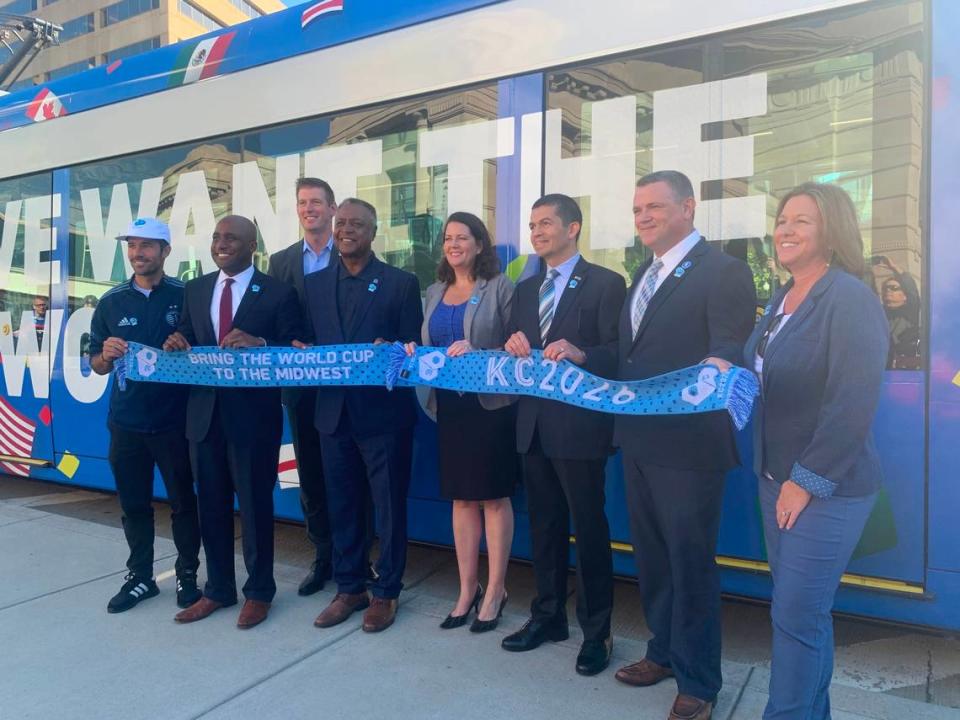Newly wrapped streetcar displays KC’s efforts to host 2026 World Cup ahead of key visit
One of the six streetcars that shuttle Kansas Citians through the downtown area showed off a distinctive, newly wrapped exterior Thursday morning.
Rolling up in front of Union Station for the first time since being transformed, the streetcar was, and will remain, emblazoned with the phrase “We Want the World Cup” — the slogan for KC’s bid to serve as a host city for soccer’s most prized event in 2026.
Kansas City, your new World Cup street car: pic.twitter.com/OtYSRCCyOc
— Shaun Goodwin (@ShaunGoodwinKC) October 14, 2021
“If you can’t tell by the wrap of the streetcar, this is a huge deal for Kansas City,” Mayor Quinton Lucas said.
Kansas City’s bid to host FIFA World Cup games in 2026 is a multi-year effort that’s approaching a day of reckoning: KC is one of 17 cities vying to host World Cup games. Only 11 will make the final cut.
FIFA’s decision about the 11 host cities is expected in the first quarter of 2022.
Next week, on Thursday, Oct. 21, a FIFA delegation of approximately 20 representatives led by Concacaf president and FIFA vice-president Victor Montagliani will visit Kansas City in person.
The streetcar wrap is a high-profile component of the KC2026 Bid Committee’s final pitch to those FIFA delegates.
“When the FIFA delegation joins us next Thursday, we will have a full day of meetings, venue tours and many chances to showcase Kansas City while pouring on the Midwestern hospitality,” bid committee director Katherine Fox said.
Some of the bid committee’s other efforts include display of a giant banner in the Crossroads Arts District, featuring art identical to what’s on the streetcar; the lighting up of the downtown skyline; and special catering for the delegation’s visit by Joe’s Kansas City Bar-B-Que.
But it’s going to take more than a Z-Man from Joe’s to land the World Cup.
The unveiling ceremony for the streetcar on Thursday offered a glimpse into the legwork the committee has put into bringing the world’s largest single-sport event to Kansas City, and what members of the FIFA delegation will experience during their visit here next week.

The delegation will be evaluating two major factors: quality of the city’s soccer facilities, and locations for the FIFA Fan Fest that’s held in conjunction with the World Cup.
During the soccer-facilities portion of the evaluation process, delegates are expected to inspect both the competition venue — in KC’s case, that’s Arrowhead Stadium — as well as training facilities for the participating teams.
“They are visiting all of the training sites that we have presented as part of the bid, which is one of our strongest bid points,” Fox said. “We have such incredible training sites that we can offer up that I think is a huge benefit for us.”
Led by Fox, Kansas City’s bid committee has been working with a number of local organizations to arrange rental of facilities for use during the World Cup. Compass Minerals National Performance Center (the soccer training facility in Kansas City, Kan.), Children’s Mercy Park, the Chiefs’ training facility, Swope Soccer Village, Missouri Western State University, Park University, Rock Chalk Park in Lawrence and Kansas City NWSL’s yet-to-be-built training facility in Riverside are all in the mix.
The FIFA Fan Fest would be designed for fans’ use as a gathering site throughout the World Cup — a place to watch every game of the tournament. The area of the city that’s chosen for the FIFA Fan Fest would effectively be closed down for up to a month for uses that are not soccer-related.
“It kind of needs to be an open area where they can erect giant television screens where people can watch any game that’s happening at any time,” Fox said. “And then sponsor activation, food vendors, things like that.”
The committee has identified Union Station, the lawn outside the World War I Museum and the south lawn of the Nelson-Atkins Museum of Art and into Theis Park as potential Fan Fest locations.
FIFA also requires bid-city committees to outline a legacy project — not only how the city would look during the World Cup, but how it would continue to be affected after the World Cup.
A study conducted by Boston Consulting Group found that hosting the World Cup might generate as much as $620 million in incremental economic revenue for a host city.
Lucas believes that figure could soar past $1 billion over time, considering the worldwide branding that hosting a World Cup would bring to Kansas City.
“I think it’s not just the 2026 World Cup we’re working for, we’re working for things throughout this decade and the next one,” he said. “To continue to show people how we have this great city in the middle of America and really, I think, the center of the world.”

